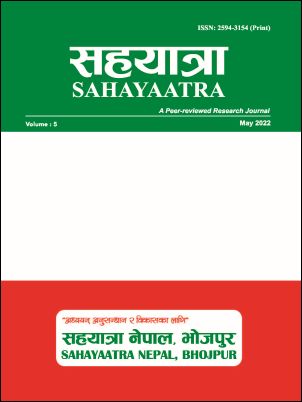Bhagwat Gita and Education: Philosophical Premises and Educational Implication
DOI:
https://doi.org/10.3126/sahayaatra.v5i1.56626Keywords:
Philosophical premises, educational implication, yoga (Karma Yoga, Bhakti Yoga, Gyana Yoga) metaphysics, epistemology, axiology, spiritual value, salvation, dutyAbstract
This paper aims to analyze and explore the Bhagwat Gita, one of the most influential religious books of Hindu literature in terms of philosophical premises and its educational implication. Similarly different aspects of philosophical thoughts such as metaphysics, epistemology and axiology also are presented with appropriate examples. This article is divided into different parts, dealing with the subject and its scope. The ideas like Jeeva (The being), Ishwora (The God) and Moksha (salvation) are presented clearly, as Gita discusses the relationship between them. Likewise, ‘Yoga’ and its types as Karma Yoga (Action), Bhakti Yoga (God) and Gyana Yoga (Knowledge) have been clearly explained. In the same way,the educational implication of the Gita concerning the true meaning of education, the ideals of education, the curriculum and the concept of moral education have also been presented. Gita, not merely a religious book,is equally important in the scientific world and modern education system. Almost all individuals have to follow the ethical path of Gita and make their contribution to the shake of humanity and make their lives meaningful by performing their duty without any desire.
Downloads
Downloads
Published
How to Cite
Issue
Section
License
This license enables reusers to distribute, remix, adapt, and build upon the material in any medium or format for noncommercial purposes only, and only so long as attribution is given to the creator.




